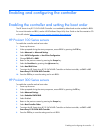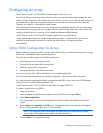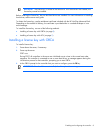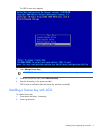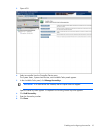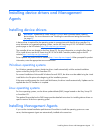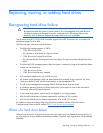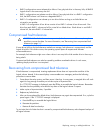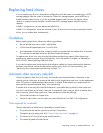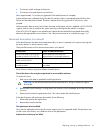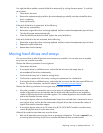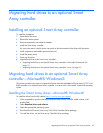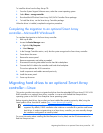
Replacing, moving, or adding hard drives 13
Replacing, moving, or adding hard drives
Recognizing hard drive failure
CAUTION: Sometimes, a drive that has previously been failed by the controller may seem to
be operational after the system is power-cycled or (for a hot-pluggable drive) after the drive
has been removed and reinserted. However, continued use of such marginal drives may
eventually result in data loss. Replace the marginal drive as soon as possible.
The HP Smart Array B110i SATA RAID Controller supports drive LED illumination only on systems with
backplane support for drive LEDs.
The following items indicate a hard drive failure:
• The following messages appear in ORCA:
o 1784: Drive Array Failure
This indicates a drive failure in a logical volume.
o 1784: Drive Array Logical Drive Failure
This indicates that the entire logical volume has failed. This may mean that multiple drives have
failed.
• The following POST messages appear when the system is restarted, as long as the controller detects
at least one functional drive:
o 1784: Drive Array Failure
o 1786: Drive Array Recovery Needed
• ACU represents failed drives with a distinctive icon.
• HP Systems Insight Manager (SIM) can detect failed drives remotely across a network. For more
information about HP SIM, see the documentation on the Management CD.
• The HP System Management Homepage (SMHP) indicates that a drive has failed.
• In Windows operating systems, the Event Notification Service posts an event to the Microsoft®
Windows® system event log and the IML.
• In Linux operating systems, systems events are logged to /var/log/messages.
• ADU lists all failed drives (on systems supported by SmartStart v8.25 or earlier).
• ACU lists all failed drives (on systems supported by ACU v8.28.13.0 or later).
For additional information about diagnosing hard drive problems, see the HP ProLiant Servers
Troubleshooting Guide on the HP website (http://www.hp.com/go/bizsupport
).
Effects of a hard drive failure
When a hard drive fails, all logical drives that are in the same array are affected. Each logical drive in
an array might be using a different fault-tolerance method. Therefore, each logical drive can be affected
differently.



